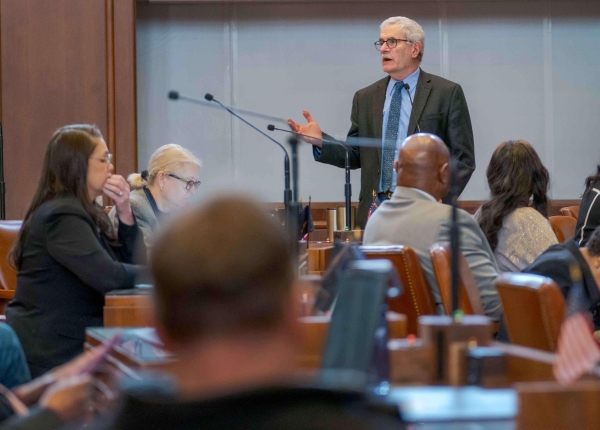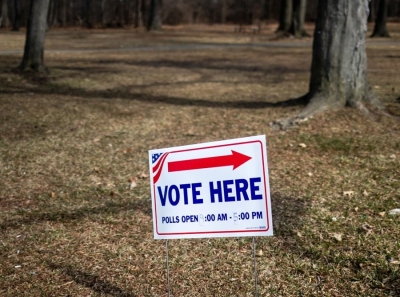Series: The Cutting: Investigating Industrial Logging in Oregon
The timber industry helped build Oregon, but now, the state has prioritized wealthy corporations over the economy and environment.
Oregon state Sen. Elizabeth Steiner seemed to have a lot of power and momentum behind her effort that would have shifted the costs of wildland firefighting further onto taxpayers this year.
The influential timber industry, which stood to save millions and is a major source of campaign cash in the state, worked behind closed doors to help craft Steiner’s proposal. Republican leaders threw their support behind it. Gov. Tina Kotek, whose staff assisted in the bill’s development, also came out in favor.
But there was fallout from the effort. Media reports noted the industry’s central role in shaping the bill. Steiner, a Democrat running for state treasurer, drew a primary challenge from another Democratic state senator, Jeff Golden, who had offered a competing bill to fund wildfire preparedness and other services by raising taxes on logging. His entry into the race had the potential to turn their divergence on the industry into a campaign issue.
And then, in the Legislature’s waning moments, Steiner’s bill died. In an email to ProPublica, she blamed “technical difficulties” without specifying what they were.
“I recognize it is not perfect,” Steiner told Golden in a hearing on Feb. 28, when her bill was still moving forward. “I think it’s damn good, excuse my language, because it’s more progress than we’ve made in a really long time.”
The bill’s failure leaves unresolved a debate over how much the timber industry pays for services like fire protection in Oregon, decades after a series of massive tax cuts whose harms Oregon Public Broadcasting, The Oregonian/OregonLive and ProPublica documented in a 2020 investigation. Those cuts have saved the industry more than $3 billion since the 1990s, the news organizations found, allowing timber companies to profit at the expense of rural communities.
Today, logging companies pay less to cut down trees than they do in neighboring Washington, state analyses have shown.
After catastrophic fires burned thousands of homes in 2020, lawmakers invested $195 million into readiness, including outfitting local fire departments and developing home hardening programs. But with costs rising and the acreage burned by fires doubling over the last decade, lawmakers are still looking for a stable source of money to prepare for and fight wildfires.
Steiner defended her ideas for raising money from taxpayers and homeowners throughout the monthlong 2024 legislative session, saying wildfires had become a statewide problem that demanded funding from all Oregonians, who already subsidize the state’s firefighting capabilities.
A lobbyist for Weyerhaeuser, Oregon’s largest private forestland owner and a participant in the drafting of Steiner’s bill, announced the initial proposal would save the company $500,000 a year. Steiner later committed to reducing the cost shift to taxpayers from $7 million to $3.5 million. When Golden proposed an amendment to ensure big timberland owners didn’t pay any less than they do now, Steiner rejected it.
A Weyerhaeuser spokesperson declined to comment about whether the company expects to pay less in future wildfire funding proposals.
“Wildfires are a shared responsibility that threatens every Oregonian,” the spokesperson said, “and moving forward we’re committed to partnering with Oregon legislators and community members on the complex issue of wildfire funding.”
One of Steiner’s fellow Democrats, state Rep. Mark Gamba, told ProPublica that Steiner’s bill would have reduced what the timber industry pays without solving a real problem that Oregon faces.
“Fires are doubling decade over decade, and our coffers to fight those fires are not doubling,” Gamba said. “I was shocked that this was even brought to us.”
Golden said Oregon needs tens of millions of dollars annually to prepare for increasing wildfire risks. Giving a tax cut to the industry, then turning to the public for more money, would be “a nonstarter,” he said.
In a departure from Steiner, Golden during the session sought voter approval to reinstate logging taxes eliminated in the 1990s. He introduced a bill that he said could have raised as much as $110 million annually for wildfire fighting, drinking water protection and the county services the logging taxes once funded. That bill stalled, was subsequently weakened to solely seek a study of those taxes, then died in committee.
As Golden and Steiner’s dueling visions for timber taxation and wildfire funding played out, Golden announced he would challenge her in the May Democratic primary for state treasurer. But he withdrew less than two weeks later, saying he realized he didn’t actually want the job.
Kotek, a Democrat, acknowledged in a Feb. 28 letter to lawmakers that differences remain about whether the timber industry is paying its fair share of wildfire costs. How much the industry contributes, she wrote, is a legitimate issue for discussion “as we work to create a comprehensive, long-term fix to our wildfire funding policies.”
Steiner, in an email to ProPublica, said her bill was always intended to be “an intermediate step toward a more equitable, sustainable solution for funding this system. We expect that the next iteration of this proposal will have more nuance.”
Golden said he will continue introducing legislation to tax the industry to pay for wildfire readiness.
“It’s going to come up in some form again,” he said, “as long as I’m in the Legislature.”
Do You Have a Tip for ProPublica? Help Us Do Journalism.
Got a story we should hear? Are you down to be a background source on a story about your community, your schools or your workplace? Get in touch.























